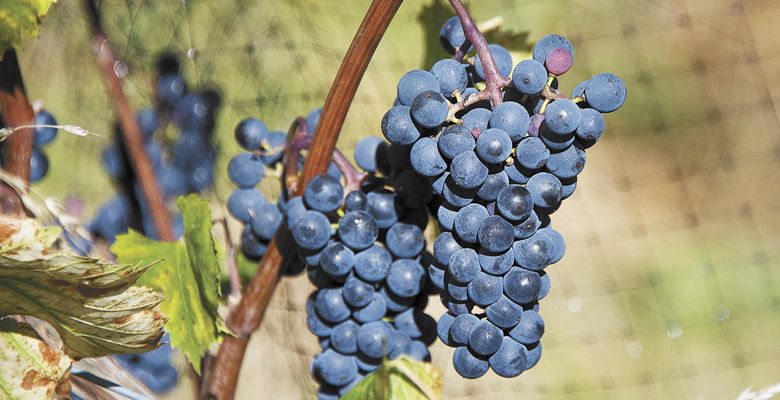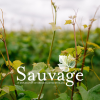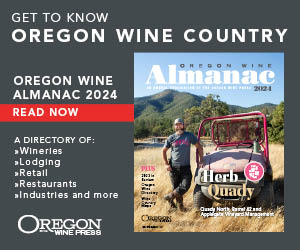Winner, Foch Sure
Clark County embraces hybrid Maréchal Foch
Still an emerging wine region, a handful of Southwest Washington vintners have been investing in Maréchal Foch (mah-reh-shal FOHSH) over the last few years find the results promising. Many predict this French hybrid grape has the potential to give Clark County a flagship grape, much like Pinot Noir in the Willamette Valley.
Brian Tansy, owner and winemaker at Olequa Cellars, ushered in the Foch frenzy when he planted two acres on his Battle Ground vineyard in 2005. In that same year, he also sourced the varietal from an Oregon grower who has since returned to his homeland of Sweden.
Tansy bottled his first vintage as a rosé, which sold out quickly. Early on, he decided focusing on another varietal — not Pinot Noir — made the most sense for his small-production winery.
Currently, Tansy is able to harvest approximately 1,200 pounds from his site, which is not fully developed due to the late spring frost. In fact, in 2009, a frost dropped nightly temperatures to the upper 20s in May. When everything fell off the vines, he suddenly had no estate production.
Even with the threat of frost, Foch likes it here on the west side of the Cascade Mountains, with the shorter, wetter growing season. The grape is also disease-resistant, which means minimal to no spraying, and is capable of making heavy red wines.

Currently, Tansy is concentrating on rosé — his personal favorite — and a full-bodied red fermented with the skins on, pressed and aged 18 to 24 months in oak. The greatest challenge has been Foch’s naturally high malic acid and experimenting with various malolactic cultures that produce low diacetyl. Most recent trials are proving successful. His 2015 Maréchal Foch rosé — already sold out — showed cherry and cranberry flavors with a tartness tasters found refreshing. His yet-to-be-released 2016 rosé is leaning more toward cherry and strawberry notes.
“It’s exciting that a lot of wineries are working with Foch now because it gives people an opportunity to go around and try the different styles and different tastes,” Tansy said.
The origins of Maréchal Foch are still uncertain with the most popular theory it is a cross between a non-viniferous grape and an early-maturing Muscat called Goldriesling. Its lack of nobility is a definite downside, but for an area desiring to cultivate and showcase what grows well, it has the potential to gain a following solely on authenticity.
Gary Gougér, owner and winemaker at Gougér Cellars Winery in Ridgefield, said, “It will enable the farmer not to have to spray near as much because it resists powdery mildew, and it will cost them far less money and time to maintain the vineyard. I think it’s a win-win for everybody.”
For that reason and more, Gougér championed efforts to plant Foch in the traffic rounds greeting visitors to the city of Ridgefield. Working with Mayor Ron Onslow, he oversaw the west-side roundabout planting in 2015 and the east side was completed in 2016. Gougér envisions it as a stunning teaser for folks traveling I-5 between Portland and Seattle, revealing what area wineries have to offer.
Beginning with a test batch in 2011 from Clark County-sourced grapes, Gougér has been steadily increasing his bottling and promotion of Foch in the area. From his experience, its versatility to go from a dark black, inky wine to a more delicate rosé is one of its greatest assets. He actually learned of its potential while earning his enology degree at the University of Adelaide in Australia while tasting in his off time.
Continuing to test the market and grape quality, Gougér bottled a scant five cases from the 2014 harvest, which sold out in one week. He plans to bottle more Foch from the 2017 harvest with a release date dependent on which style he chooses. His next goal is a Foch-based port and sparkling wine to demonstrate its versatility to consumers.
Ridgefield neighbor Confluence Vineyards & Winery has sourced local Foch for the last three years and is now working with four vineyard sites.
Greg Weber, Confluence co-owner and winemaker, said, “We do intense, big reds, focusing on Washington state fruit. We wanted a deep, dark structured red. It is grown a lot in upstate New York, but it is not a noble grape varietal; that’s the downside.”
Part of the S.W. Washington Winery Association, Weber’s goal is to develop a strong estate grape. To that end, he’s adding a small test vineyard of 100 Foch plantings in 2017. For the last three years, he’s been impressed with his findings. Working with vines in their third, fourth and fifth years, Weber has consistently recorded 25½ brix with a late September harvest.
Because of its aggressive growth — its nickname is “Cousin It” — Weber is working on different trellising systems that will encourage quality fruit with minimum netting.
Like other area vintners, he realizes the importance of establishing a unique identity for Southwest Washington and believes the bold reds Foch is capable of can stand up to eastern Washington wines. According to Weber, Maréchal Foch from Confluence is reminiscent of Syrah but with more vibrant fruit. As a result, he intends to utilize it in small quantities as a blending grape to add bright fruit notes to one of his wines with the 2017 harvest.
“I don’t think Foch is the only thing we want to hang our hat on as an identity, but its possibilities should be pursued,” Weber said.
Viki Eierdam is the wine columnist for The Columbian and a freelance writer. She lives in Battle Ground, Washington.








